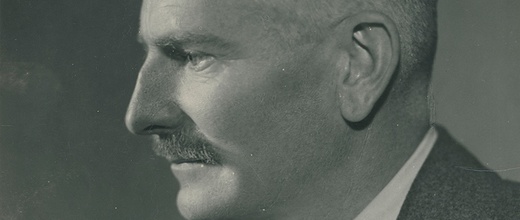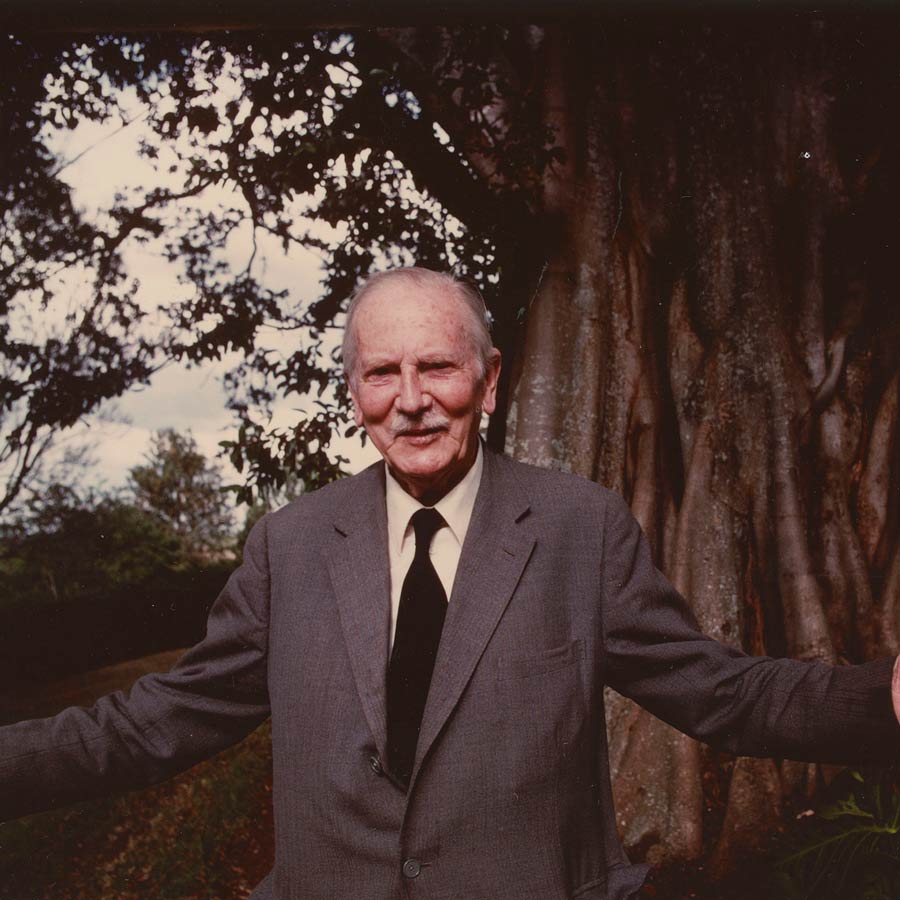The International Tree Foundation is in the midst of an ambitious plan—plant 20 million trees in and around Kenya’s highland forests by 2024, the organization’s centenary.
That goal is one of the many living expressions of the ideals espoused by Richard St. Barbe Baker (1889-1982), founder of the organization. Mr. Baker, who was best known as St. Barbe, was a pioneering environmentalist and early British Baha’i who had a far-reaching vision and initiated practices that have become common and widespread today.
A re-evaluation of this influential environmental pioneer is now under way, thanks to the work of the International Tree Foundation and the publication of a new biography. The recent attention comes at a time when the consequences of global climate change are increasingly apparent to humanity.
“Long before the science of climate change was understood, he had warned of the impact of forest loss on climate,” writes Britain’s Prince Charles, in the forward of the new biography about St. Barbe. “He raised the alarm and prescribed a solution: one third of every nation should be tree covered. He practiced permaculture and agro-ecology in Nigeria before those terms existed and was among the founding figures of organic farming in England.”
Having embraced the Baha’i Faith as a young man in 1924, throughout his adventurous life St. Barbe found in the teachings of Baha’u’llah the embodiment of his highest aspirations for the world. His deep faith was expressed in a love for all forms of life and in his dedication to the natural environment.
“He talks about the inspiration he received from the Faith and from the writings of Baha’u’llah and Abdu’l-Baha,” explains Paul Hanley, the author of a new biography about St. Barbe: Man of the Trees: Richard St. Barbe Baker, the First Global Conservationist. “St. Barbe had a world embracing vision at a time when that wasn’t really common. His frame of reference was the whole world.”
St. Barbe noted this connection with Baha’u’llah’s vision of the oneness of humanity when he went on pilgrimage to the Shrine of Baha’u’llah.
“(H)ere at Bahji (Baha’u’llah) must have spent his happiest days. He was a planter of trees and loved all growing things. When his devotees tried to bring him presents from Persia the only tokens of their esteem that he would accept were seeds or plants for his gardens,” St. Barbe later wrote in his diary, quoted in Mr. Hanley’s book.
St. Barbe then recalled a passage from Baha’u’llah’s writings: “‘Let not a man glory in this, that he loves his country; let him rather glory in this, that he loves his kind.’ Yes, I thought, humankind, humanity as a whole. Was it not this for which I had been striving to reclaim the waste places of the earth? These were the words of a planter of trees, a lover of men and of trees.”
St. Barbe also maintained a sustained contact with Shoghi Effendi, the Guardian of the Baha’i Faith, who encouraged him in dozens of letters and sought his advice when selecting trees for Baha’i Holy Places in Akka and Haifa. St. Barbe described how the inscribed copy of The Dawn-Breakers that Shoghi Effendi sent him became his “most treasured possession.”
“I would read it again and again, and each time capture the thrill that must come with the discovery of a New Manifestation,” St. Barbe wrote.
The International Tree Foundation, which St. Barbe originally named Men of the Trees, is just one of many organizations he established in his lifetime. It is estimated that, as a result of his efforts, the organizations he founded, and those he assisted, some 26 billion trees have been planted globally. He was so dedicated to tree planting, in fact, that he took an international trip at age 92 to plant a tree in memory of a close personal friend, a former prime minister of Canada. St. Barbe died a few days after accomplishing the purpose of that trip.
“I think people should know about Richard St. Barbe Baker because his legacy still lives on,” says the Foundation’s chief executive, Andy Egan.
“Today we try to walk in St. Barbe’s footsteps,” adds Paul Laird, the Foundation’s programs manager. “We have a sustainable community forestry program, which reaches out and tries to work particularly with groups and local community-based organizations that are close to the real situation—the people themselves doing things for themselves, who understand the threats of land degradation and forest loss, and what that actually means for them.”
Listen to a podcast about Richard St. Barbe Baker at news.bahai.org/podcast.
For more about Richard St. Barbe Baker check out the BahaiTeachings.org series The Man of the Trees.


















Comments
Sign in or create an account
Continue with Facebookor